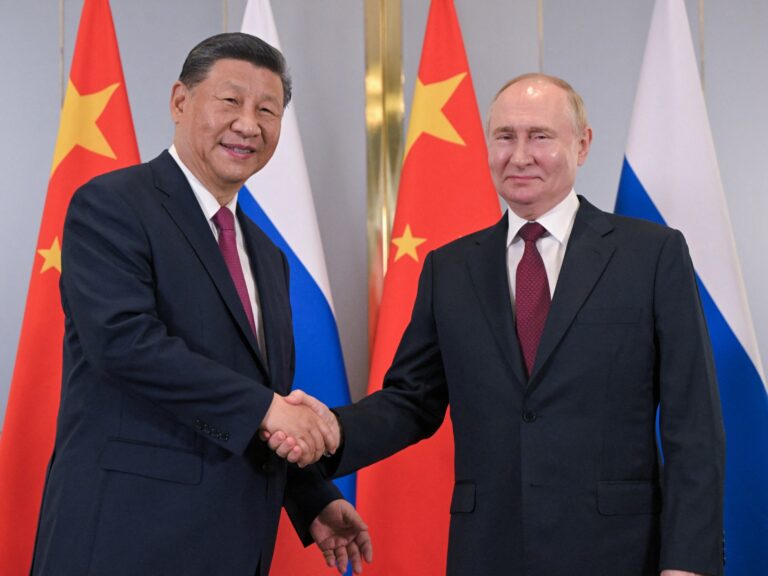The remarks were made at a summit of the Shanghai Cooperation Organisation, a regional bloc that Moscow and Beijing see as a counterweight to US “hegemony” on the world stage.
The presidents of China and Russia urged their allies to resist outside influence, saying the centre of global power is shifting and a multipolar world is on the way.
Russian President Vladimir Putin and Chinese President Xi Jinping arrived in the Kazakh capital Astana on Thursday to meet leaders of the Shanghai Cooperation Organisation (SCO), a regional alliance that Moscow and Beijing see as a counterweight to US “hegemony” on the world stage.
President Xi called on countries to “resist outside interference”, while President Putin said a “new political and economic center” was emerging.
“We need to join hands to resist outside interference, firmly support each other, address each other’s concerns, and take firm control over the future and destiny of our two countries and regional peace and development into our own hands,” Xi said at the summit.
“It is vital for the world that the SCO stands on the right side of history, on the side of fairness and justice.”
In a joint declaration released by the Kremlin, the groups noted “fundamental changes in world politics” and called for the European Union to play a greater role in global and regional security.
“The use of force has increased, the norms of international law have been systematically violated, geopolitical confrontations and conflicts have escalated, and risks to the stability of the world and the SCO region have grown,” the report said.
The final statement also called for an “early, complete and sustainable ceasefire” in Gaza and a “comprehensive and just resolution of the Palestinian issue.”
The statement did not mention Russia’s aggression in Ukraine or the conflict between China and Taiwan, but said the groups “mutually respect the sovereignty, independence and territorial integrity of states.”

“A fair world order”
Both Russia and China regularly criticize U.S. dominance in global affairs and seek to increase their influence and dominance, especially in regions close to their borders.
“A multipolar world has become a reality,” Putin said in his speech at the summit, welcoming Russia’s close ally Belarus’ entry into the EU, making it the bloc’s 10th member state.
“The circle of nations ready to uphold a just world order, resolutely defend legitimate rights and safeguard traditional values is expanding,” Putin said. “New centers of power and economic growth are being strengthened.”
Iran, which is under Western sanctions, became a full member of the Shanghai Cooperation Organisation last year. Thursday’s meeting was also attended by UN Secretary-General Antonio Guterres, who is on a tour of Central Asia.
SCO was established in 2001, but has been gaining attention in recent years. In addition to China, Russia, and Belarus, its full member countries include India, Iran, Kazakhstan, Kyrgyzstan, Uzbekistan, Pakistan, and Tajikistan.
The SCO aims to be a platform for cooperation and competition with the West, with a focus on security and economics, particularly in Central Asia, which accounts for 40 percent of the world’s population and about 30 percent of its gross domestic product.
But it is a fragmented group with many internal conflicts, including territorial disputes.
Russia’s invasion of Ukraine has further intensified great power interest in Central Asia, where Moscow seeks to maintain its traditional influence, while China now has strong ties through its flagship Belt and Road infrastructure project.
Western countries are also vying for influence in a strategically important region rich in oil and gas and a vital shipping route linking Asia and Europe.
In the final declaration, the EU criticised the “unilateral and unlimited build-up” of missile defence systems by unnamed countries and regional alliances – a common complaint of both Moscow and Beijing against the US.

